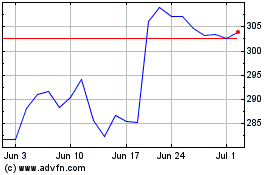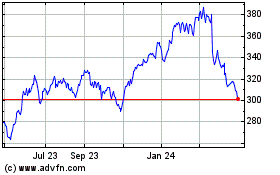Trust in Banks Highest Since 2012, but Declining Branch Visits & Increased Digital Transactions Risk Eroding Customer Relatio...
May 08 2018 - 7:01PM
Business Wire
U.K. consumers’ trust in their banks is at the highest level
since 2012, but the decision of some banks to increase digital-only
interactions risks alienating customers of all ages, according to
new research by Accenture (NYSE: ACN).
Accenture's U.K. Financial Services report, which surveyed
approximately 4,600 adults, found consumer trust in banks over the
past two years jumped 39 percent, or 11 percentage points, to 40
percent – on par with the level of consumer trust of high-street
retailers. At the same time, customer satisfaction with banks
increased 8 percent, or 5 percentage points, to 70 percent – well
ahead of the 57 percent satisfaction level in 2012.
This boost in trust and satisfaction coincides with a vast
increase in digital banking services, as consumers make more
frequent, but fleeting, banking transactions. But overall, U.K.
consumers are physically interacting with banks much less.
For instance, the number of consumers who visit branches at
least once a month has tumbled 38 percent, from 52 percent to
32 percent, since 2015, while the number of consumers who use ATMs
at least once a month has dropped 20 percentage points, to 62
percent – representing a 24 percent decline. Meanwhile, the
percentage using mobile banking regularly has remained static at 34
percent. The number of consumers who transact with their bank by
telephone at least once a month dropped from 16 percent to 9
percent, with millennials calling their bank more than any other
age group.
Despite reduced bank branch visits, consumers still want human
advisers for banking services. Seven in 10 consumers want the
ability to raise a complaint with a human adviser, while almost
two-thirds (63 percent) want to be able to open an account in
person. Almost half (48 percent) want to be shown hands-on how to
use the bank’s mobile and online services.
“The jump in consumer trust is good news for banks, showing
improvements in digital services are working, said Peter Kirk, who
leads Accenture’s Financial Services Distribution and Marketing
practice in the U.K. “At the same time, the number of customers
regularly visiting the branch is significantly reducing, but the
number of customers regularly using mobile digital service remains
static. This could be a concern for the banks as consumers still
say they want to have the human touch. The next challenge is how
banks provide convenient customer experiences that blend human and
digital services to stop them becoming faceless and putting their
newly earned trust at risk.”
Banks will be penalised if not personalised
Two-thirds (66 percent) of surveyed consumers said it was
important a bank used personal data to provide advice relevant to
their personal circumstances, with more than half (56 percent)
saying they would find personalised offers based on their location
to be useful.*
In fact, personalisation was the top cited factor for choosing a
current bank account provider. Of the 14 percent of consumers who
switched banking providers over the last year, more than a quarter
did so due to lack of personalised services, with millennials more
likely than any other age group to switch banks if services are not
personalised.
In a move backing greater use of artificial intelligence (AI) to
serve customers personally, 40 percent of surveyed consumers would
support banks analysing their spending patterns to warn them if
they could overspend that month. More than a quarter of Generation
Zers and millennials (27 percent each) said they would use instant
messenger to have a natural conversation with their bank.
Despite acknowledging the value of exchanging personal data for
convenient banking services, only 5 percent of consumers
believe that their personal financial data would be more secure
with AI than with a human advisor. Additionally, 70 percent said
they would not want to use social media channels to conduct banking
activities or communicate with their bank on social media.
“Because consumers today expect banks to anticipate their needs
and offer tailored services, the key will be offering the right
balance of personalised, relevant offers and interactions, rather
than impersonal transactions,” Kirk said. “Consumers want natural
conversation with a bank that understands their needs and acts in
their best interest, while keeping their data safe and secure. This
is particularly significant given the data revolution expected with
open banking in the U.K., which will challenge banks to compete on
consumer experience. We know that customers have evolving attitudes
towards the privacy of their personal data and the introduction of
General Data Protection Regulation (GDPR) in May will add further
fuel to the fire. Banks will be keenly aware of the need to let the
customer retain control and to be careful not to cross the line
from convenient to intrusive.”
Read the full report here: Accenture’s UK Financial Services
Customer Survey 2018
Methodology
Accenture surveyed 4,599 U.K. consumers of banking, insurance
and wealth management services. Respondents were required to have a
bank account. Respondents covered multiple generations and income
levels. The survey was conducted during December 2017 and
January 2018. *UK banking consumer data results from a sample
size of 2534 adults.
About Accenture
Accenture is a leading global professional services company,
providing a broad range of services and solutions in strategy,
consulting, digital, technology and operations. Combining unmatched
experience and specialized skills across more than 40 industries
and all business functions – underpinned by the world’s largest
delivery network – Accenture works at the intersection of business
and technology to help clients improve their performance and create
sustainable value for their stakeholders. With approximately
442,000 people serving clients in more than 120 countries,
Accenture drives innovation to improve the way the world works and
lives. Visit us at www.accenture.com.
View source
version on businesswire.com: https://www.businesswire.com/news/home/20180508006247/en/
AccenturePetra Shuttlewood, +44 7788
305373petra.shuttlewood@accenture.comorNatalie de Freitas, +44 7988
165 392natalie.de.freitas@accenture.com
Accenture (NYSE:ACN)
Historical Stock Chart
From Mar 2024 to Apr 2024

Accenture (NYSE:ACN)
Historical Stock Chart
From Apr 2023 to Apr 2024
